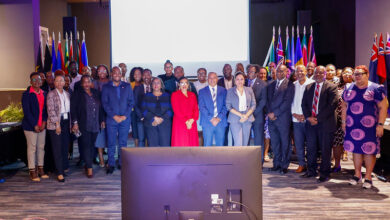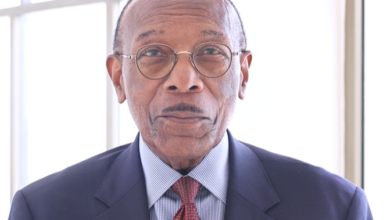Mr. John Hamilton, Principal Deputy Assistant Secretary for Western Hemisphere Affairs; Other officials of the United States Government;
My colleague Ministers from the Caribbean, as well as the Ambassadors and other diplomats from the States of the Caribbean Region.
Ladies and Gentlemen.
It is said that, in a newly-established democracy, the third election is the true test of viability of the democratic process. In a newly-established process between democracies, it is the third meeting which truly indicates that the process is viable. I am most pleased to be here in Washington to ensure that our words have meaning, and to help map the future of the relationship between the USA and the Caribbean.
At our last meeting in Antigua, one year ago, we promised that all would be done to ensure that the relations between our sub-region and the United States would indeed be strengthened. I am pleased to note that our friendship is strengthened.
I note the strengthening of this relationship against the background of the recent calls in our region for a thorough analysis of the pace and direction of the actions taken or not taken under the historic Bridgetown Accord.
I wish to recall that the Declaration of Principles recognises that there is “… an inextricable link between trade, economic development, security and prosperity in our societies.” This simple yet profound statement lies at the heart of our relationship, and remains a guide for all our actions.
We are charged this morning with taking up the critical issues relating to bananas, CBI enhancement, OECS membership in the Inter-American Development Bank (IDB), the terms and conditions of the proposed Open Skies Agreement, the question of accounting rates for international telecommunications and the resources required to meet the mammoth and urgent
task of economic diversification in the region. Another area which can never be forgotten is disaster preparedness, especially as we are already into the 1999 hurricane season. These areas constitute only a representative sample of the many issues which require our urgent attention.
We are under no illusions that much still remains to be done in these important areas, and we on the Caribbean side pledge our fullest cooperation to advance the technical work as much as we can. For it is on sound technical work that progress at the political level will be based.
It is no secret, Mr. Chairman that there are voices in our region that have complained that progress on implementation of the matters agreed under the Bridgetown Accord has been unbalanced. Unbalanced not only between the two broad areas of the Agreement, but within each area. In our view, we are forced to concede that there is validity to this assessment .
In light of this, our task here will be to deliver tangible progress in the several key sectors and by doing so to dispel all notions of unbalanced progress under the Bridgetown Accord.
In our quest to further our development, Caribbean countries are determined to diversify their economies. We see the field of offshore financial services as a promising area of legitimate business into which Caribbean countries can enter. We take this opportunity to reiterate our commitment to establishing and maintaining clean jurisdiction and to being effective allies in the global battle against money-laundering.
However, we also wish to reiterate our grave concerns regarding what the rich countries of the world have deemed “harmful tax competition” from offshore jurisdiction, and the policy implications that flow from it. We are of the view that the notions contained in the OECD report are deeply injurious to our interests, and are in need of serious review.
We anticipate that our discussions today will have the effect of substantially strengthening the relations between the United States and the Caribbean region, and I call on all members of the various Committees to go the extra mile in the great cause which we are here to serve.
Thank you





